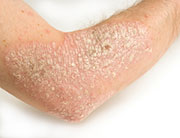Relationship held after accounting for other cardiovascular disease risk factors
FRIDAY, Oct. 9, 2015 (HealthDay News) — As the amount of psoriasis increases, the amount of vascular inflammation increases, according to research published online Oct. 8 in Arteriosclerosis, Thrombosis, and Vascular Biology.
Nehal Mehta, M.D., a clinical investigator with the U.S. National Heart, Lung, and Blood Institute, and colleagues compared 60 adults with psoriasis to 20 people without the condition. All participants were in their 40s on average and at low risk for cardiovascular disease. Some had mild psoriasis — a few patches on less than 3 percent of their skin. Severe cases involved patches covering more than 10 percent of the skin.
Despite severity, positron emission tomography scans revealed that all participants with psoriasis had increased levels of vascular inflammation. The most severe psoriasis was associated with a 41 percent increase in vascular inflammation, compared with participants without psoriasis. The relationship between psoriasis and increased vascular inflammation didn’t significantly change after accounting for other cardiovascular disease risk factors, such as blood pressure, cholesterol, blood glucose, weight, and smoking. The team also found that even mild psoriasis may indicate an increased risk for heart attack and stroke.
Just one psoriasis skin patch, or plaque, “might be biologically active, causing low-grade inflammation and starting a cascade, speeding up their blood vessel disease,” Mehta told HealthDay. His team is now conducting a study to see if treating psoriasis lowers vascular inflammation.
Copyright © 2015 HealthDay. All rights reserved.








